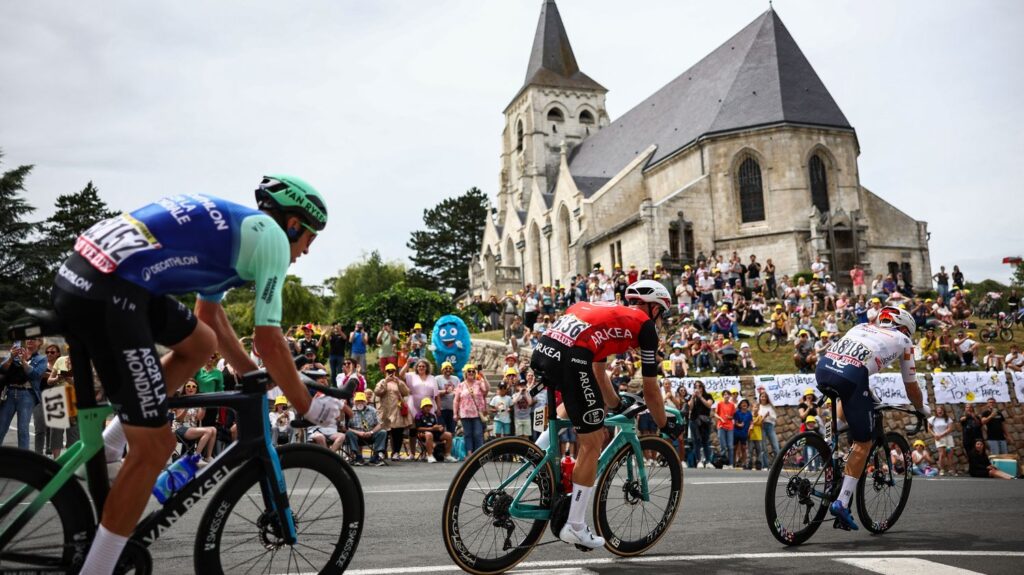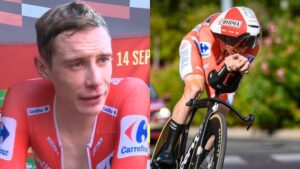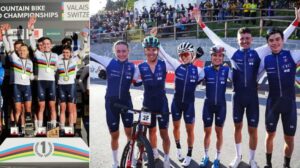
Five French teams are engaged on the Tour de France, but one of them, Arkéa-B & B Hotels, could disappear at the end of the year.
/2023/06/20/6491811e45f62_hortenserond.png)
Published
Reading time: 8min
/2025/07/20/000-64vc7rz-687d008ce4173084733557.jpg)
Count among the best teams, with one of the biggest budgets in the peloton … The ambition of the future Decathlon team is almost task in the current French cycling landscape. The economic situation is much darkener, and the uncertain future for other tricolor teams, including Arkéa-B & B Hotels which imperatively seeks new sponsors to survive beyond 2025. On the Tour de France, none of the five blue-white-red formations won a stage during the first two weeks.
The first explanation lies in the budget differences of these French teams, with the foreign teams. “The best world teams have a budget of 50 million euros, where in France we are around 25 million. From the outset, we are not on the same bases”underlines Cédric Vasseur, boss of the Cofidis training. “There was a very strong inflation of the budgets 10-15 years ago with the Sky and the American and English teams, which were hyper professionalized and structured. There was an inflation of wages and we arrive at two-speed cycling, explains Virgile Caillet, general delegate of the Union Sport & Cycle. When there was this acceleration at the international level, France has failed to change gear and remained a bit in cycling of the 2000s “.
“In France, we have difficulty mobilizing means around sport. By comparison, in Ligue 1, a number of clubs have budgets around 40 million euros”he continues. And with these lesser budgets, the tricolor teams have the obligation, by French law, to pay their runners, with the charges that follow. While in foreign teams, runners can have independent status and invoice their services without additional expenses. “Teams must provide salaried runners with insurance and pension. Independent runners must obtain their own insurance and pension plan”writes the joint agreement that governs the working conditions of cycling runners.
“With the charges, it's simple, it costs us 40% more expensive than elsewherePointe Marc Madiot, the boss of Groupama-FDJ. We are a very special country, foreigners tell us and they laugh. We were undoubtedly better protected during the covid, but in periods of normality, these people are advantaged on us “. Therefore, “A runner who can potentially win the Tour is a runner whose salary is around 10 million euros. But in France, he would cost his team 14 million, that makes a big difference. So we are not trying to compete with these teams, it is a fight lost in advance because we do not have the same rules of the game”explains Cédric Vasseur.
As in other sports, football for example, French training is found to fight against unequal competition, with in addition foreign teams funded by states, such as UAE Team Emirates (United Arab Emirates), Bahrain Victorious (Bahrain), XDS-Astana (Kazakhstan), Israel-Prime Tech, (Alula being a city of Saudi Arabia). “There are states or patrons that have bottomless pockets. We can see it in the Netflix series where the president of UAE says that if tomorrow it should cost the double, it will not be a concern”Pointe Emmanuel Hubert, boss of Arkéa-B & B Hotels.
3min
Would there be too many French teams and therefore economic competition to attract sponsors? Virgile Caillet in the possibility: “The potential of advertisers and partners is starting to run out of steam, and if there are too many offers, it lowers prices. Perhaps the number of French teams affects attractiveness and that you have to get sponsors elsewhere”. But the hypothesis is refuted by Cédric Vasseur, who highlights “The number of French runners”since France is the most represented country among the World Tour teams (81 runners), and “The number of races in France, higher than abroad”which therefore justify the number of teams.
“You also have to keep teams like ours, it's part of the cycling landscape and the French public needs to have this style of French team to identify yourself”assures Emmanuel Hubert. But “Cycling is very expensive for a French company, is profitable enough for a European company and is a gift for a global company”explains Jean-René Bernaudeau, boss of the Totalenergies team, a team that ultimately has the most international of sponsors among French training courses.
Emmanuel Hubert experiences it in the search for partners to save his team. “It's very very difficult”he confides, despite the good results on the Tour de France of his runner Kévin Vauquelin, who brings visibility to Breton training. “In France, we still have real sponsors who need to communicate. But at some point, when you rationalize the sponsor budget, with the return on investment for the company, it is less valid than what we have known 10 years ago. To have the same returns, you should no longer invest 10 at the start, you have to put 20” he analyzes.
And abroad, Jean-René Bernaudeau says he has met large Asian companies in Japan or South Korea, “But this continent needs a little more credibility. There is always a little suspicion (around doping) which is not necessarily justified but which is still there “.
Decathlon, a French company but with an international network, does not play in the same table. Its development strategy is also based on the promotion of its Van Rysel bicycle brand, and the company should find an international co-sponsor to regain control of the historic team AG2R-La Mondiale. “They are creating a hyper interesting desirability for partners but also for runners. Rivating with international teams will in any case require different economic creativity”observes Virgile Caillet.
With this in mind, an original initiative is carried out by a collective of Savoyard entrepreneurs, who want to create a female and male professional cycling team, “My little business”exclusively supported by VSEs and SMEs. Already 500 companies have answered the call with a minimum set of 750 euros. And the objective of participating in the Tour de France in 2030.
/https%3A%2F%2Fassets.webservices.francetelevisions.fr%2Fv1%2Fassets%2Fimages%2F1e%2F3b%2F00%2F46b9a737-0a98-4522-a0af-b6aa05536ad5.jpg)

